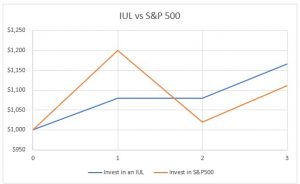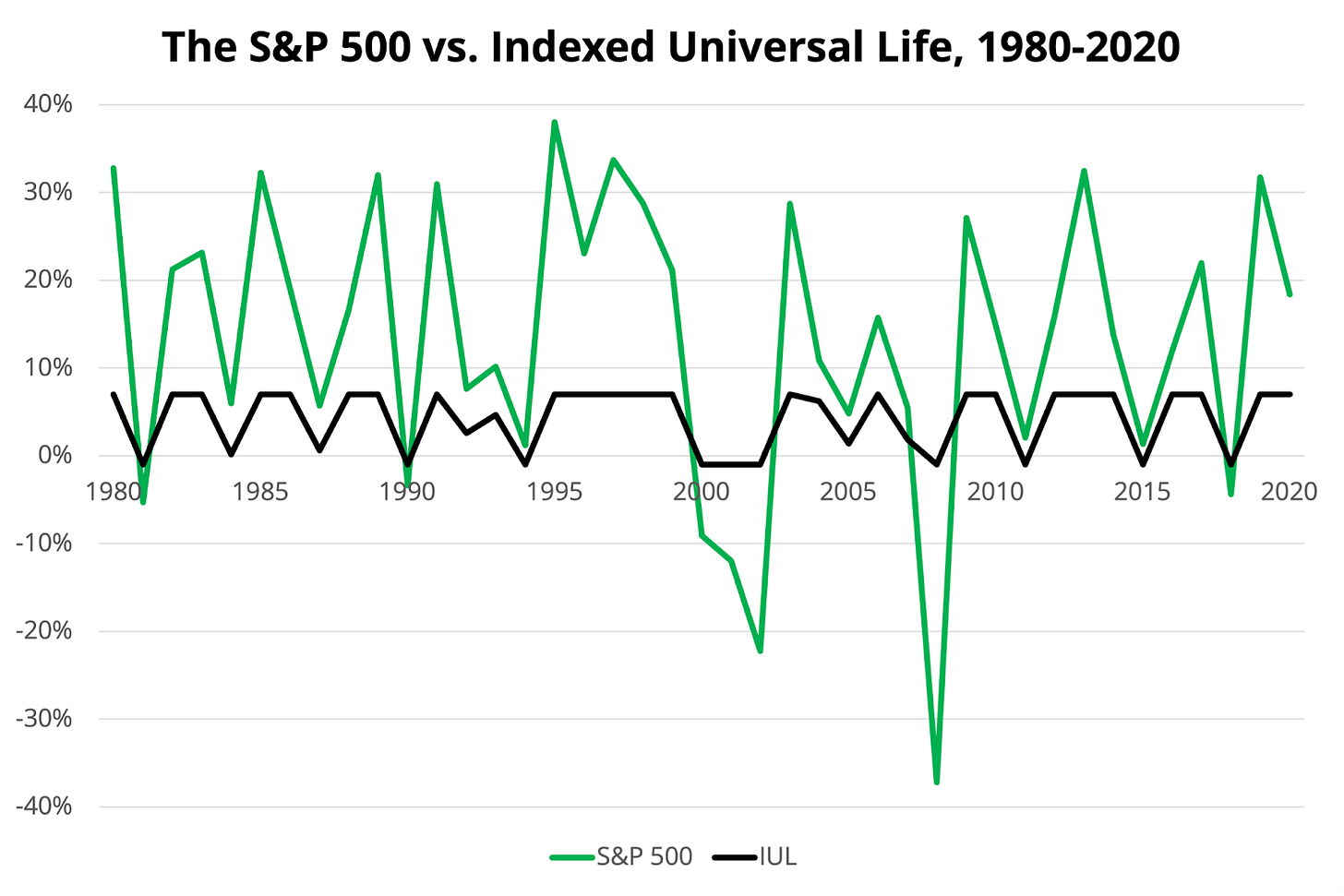All Categories
Featured
Table of Contents
Do they compare the IUL to something like the Lead Total Amount Supply Market Fund Admiral Shares with no load, a cost ratio (EMERGENCY ROOM) of 5 basis points, a turn over ratio of 4.3%, and an exceptional tax-efficient record of distributions? No, they compare it to some horrible actively taken care of fund with an 8% tons, a 2% ER, an 80% turnover ratio, and a horrible document of temporary funding gain circulations.
Mutual funds frequently make yearly taxed circulations to fund proprietors, also when the worth of their fund has actually decreased in worth. Shared funds not only call for income reporting (and the resulting annual taxes) when the shared fund is increasing in value, but can additionally impose revenue tax obligations in a year when the fund has actually decreased in value.
That's not exactly how mutual funds function. You can tax-manage the fund, harvesting losses and gains in order to minimize taxable circulations to the financiers, however that isn't somehow going to transform the reported return of the fund. Just Bernie Madoff types can do that. IULs prevent myriad tax obligation traps. The possession of shared funds might require the mutual fund owner to pay projected taxes.

IULs are very easy to place to ensure that, at the owner's fatality, the recipient is not subject to either revenue or inheritance tax. The very same tax decrease methods do not function nearly also with mutual funds. There are numerous, typically costly, tax obligation catches connected with the timed buying and selling of shared fund shares, catches that do not put on indexed life Insurance policy.
Possibilities aren't extremely high that you're going to be subject to the AMT as a result of your common fund circulations if you aren't without them. The rest of this one is half-truths at ideal. While it is real that there is no income tax due to your successors when they acquire the profits of your IUL policy, it is also real that there is no income tax due to your heirs when they acquire a common fund in a taxable account from you.
Iul Life Insurance Canada
There are better ways to avoid estate tax issues than purchasing financial investments with low returns. Shared funds may trigger earnings taxation of Social Security advantages.

The development within the IUL is tax-deferred and may be taken as tax cost-free revenue using loans. The policy proprietor (vs. the shared fund manager) is in control of his or her reportable income, hence enabling them to minimize or even get rid of the tax of their Social Safety and security advantages. This set is great.
Here's an additional very little concern. It's real if you get a shared fund for claim $10 per share simply prior to the circulation date, and it distributes a $0.50 distribution, you are then going to owe tax obligations (probably 7-10 cents per share) although that you haven't yet had any type of gains.
Yet in the end, it's really about the after-tax return, not just how much you pay in tax obligations. You are going to pay even more in tax obligations by making use of a taxed account than if you buy life insurance policy. However you're also probably going to have even more cash after paying those taxes. The record-keeping needs for having common funds are considerably more complex.
With an IUL, one's documents are kept by the insurance provider, copies of yearly declarations are sent by mail to the owner, and distributions (if any type of) are completed and reported at year end. This is additionally type of silly. Obviously you must maintain your tax obligation records in instance of an audit.
Universal Insurance Near Me
All you need to do is shove the paper right into your tax folder when it turns up in the mail. Barely a reason to purchase life insurance policy. It resembles this man has actually never invested in a taxed account or something. Mutual funds are typically component of a decedent's probated estate.
Furthermore, they go through the delays and costs of probate. The proceeds of the IUL policy, on the other hand, is always a non-probate distribution that passes beyond probate straight to one's named recipients, and is consequently exempt to one's posthumous financial institutions, undesirable public disclosure, or similar delays and costs.
We covered this under # 7, yet simply to recap, if you have a taxable shared fund account, you need to place it in a revocable trust (or perhaps simpler, use the Transfer on Fatality classification) in order to stay clear of probate. Medicaid disqualification and life time income. An IUL can provide their proprietors with a stream of income for their entire life time, despite how lengthy they live.

This is beneficial when organizing one's events, and transforming properties to revenue prior to an assisted living home confinement. Shared funds can not be transformed in a similar manner, and are often taken into consideration countable Medicaid properties. This is an additional dumb one advocating that inadequate people (you know, the ones that need Medicaid, a federal government program for the poor, to spend for their assisted living home) should utilize IUL rather than common funds.
Nationwide Iul
And life insurance policy looks awful when compared rather against a retired life account. Second, individuals that have cash to acquire IUL above and beyond their retirement accounts are mosting likely to need to be dreadful at taking care of cash in order to ever before receive Medicaid to pay for their assisted living facility prices.
Persistent and terminal ailment cyclist. All plans will allow an owner's very easy access to cash from their plan, usually waiving any abandonment penalties when such individuals endure a severe disease, require at-home treatment, or end up being confined to a nursing home. Mutual funds do not provide a comparable waiver when contingent deferred sales fees still relate to a shared fund account whose proprietor needs to sell some shares to fund the costs of such a stay.
Smart Universal Life Insurance
You obtain to pay even more for that advantage (motorcyclist) with an insurance coverage policy. Indexed universal life insurance gives death advantages to the beneficiaries of the IUL proprietors, and neither the proprietor nor the beneficiary can ever before lose money due to a down market.
I certainly do not require one after I reach economic independence. Do I desire one? On standard, a purchaser of life insurance policy pays for the real expense of the life insurance policy advantage, plus the costs of the plan, plus the profits of the insurance firm.
Veterans Universal Life Insurance
I'm not entirely sure why Mr. Morais tossed in the whole "you can't lose cash" once again here as it was covered rather well in # 1. He simply intended to duplicate the most effective marketing factor for these points I suppose. Once more, you don't lose nominal dollars, but you can shed genuine bucks, in addition to face severe opportunity cost due to reduced returns.

An indexed universal life insurance coverage policy owner may trade their policy for a completely various plan without activating income taxes. A mutual fund owner can not relocate funds from one shared fund company to one more without selling his shares at the former (therefore causing a taxable occasion), and repurchasing new shares at the last, typically based on sales costs at both.
While it holds true that you can exchange one insurance plan for another, the factor that individuals do this is that the first one is such an awful plan that also after acquiring a new one and going with the very early, negative return years, you'll still come out ahead. If they were offered the best plan the first time, they shouldn't have any type of need to ever before exchange it and go via the very early, adverse return years once more.
Latest Posts
Iul Illustration Example
Universal Life Rates
Nationwide Yourlife Indexed Ul Accumulator